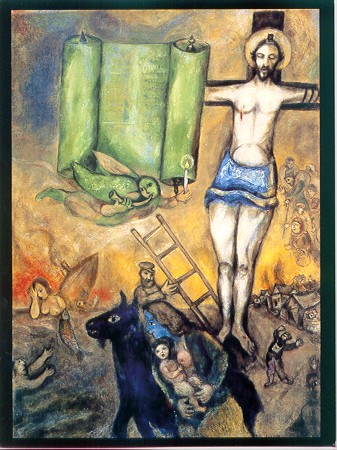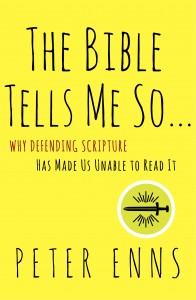This week’s Question That Haunts Christianity cames from Nina:
Questions that haunt: did people of Jesus’ time even expect the stories they were telling to be taken literally? Would they be shocked to learn that 2,000 years later we are interpreting them that way?
They told lots of stories then about people who were sons of god, and born of virgins, and resurrected — these were themes that came up regularly. It doesn’t seem to me (or to most scholars since David Friedrich Strauss, I think), that first century folks approached storytelling with the idea that their stories were literally accurate (they instead were symbolically True).
What if when we try to interpret the virgin birth or the resurrection as historically true (rather than symbolically True) we’re just completely misunderstanding the original intent of these stories? What if people in antiquity were way more sophisticated than we are, and they would think we were impossibly thick to be interpreting their beautiful stories this way?
To give a modern example, what if I had a southern friend who said “She’s so crazy about her man, it’s like he hung the moon.” And I said, “Oh, I don’t think his ladder would reach that high.” Imagine the reaction I would get….
Great comments, as always. This week, there wasn’t really one thread that dominated, but lots of smaller threads, chasing down various ideas. I’ll probably touch on lots of them with my more narrative response:
I am once again teaching Introduction to the New Testament at a state university here in Minnesota. It’s a great time — I am really growing to love teaching undergrads. Last night was our last class before the midterm. We’ve studied the religious, cultural, literary, and political context of first century Palestine, and we’ve spent a week each on the four Gospels. Last night, the topic was “The Historical Jesus.”
I taught about when the quest for the historical Jesus began (early 19th century), about the book that was supposed to end the quest (Quest for the Historical Jesus by Albert Schweitzer), about the the quest continued through the mid-20th century (Rudolph Bultmann) and into the late-20th century (the Jesus Seminar). Then I attempted to show how completely futile is the quest for the historical Jesus, by showing these three artifacts:
1) The scene of the Cleansing of the Temple in Jesus Christ Superstar.
2) The 60 Minutes interview from last week with Bill O’Reilly, in which he claims that Jesus was crucified not because he claimed to be God — lots of people claimed that, O’Reilly said — but because Jesus cleansed the Temple of moneychangers. In O’Reilly’s universe, Jesus was standing up for the “folks” by interrupting the money flow caused by overtaxation.
3) Then I read a couple paragraphs from a book that Courtney is reading, World Peace Diet: Eating for Spiritual Health and Social Harmony, in which the authors claims that Jesus’ cleansing of the Temple was “an act of animal liberation,” and that,
“It was for this flagrantly revolutionary act that Jesus had to be crucified by the herding culture’s power elite.”
Then, of course, I read them the passage about the cleansing of the Temple from Matthew. It’s two verses long:
Then Jesus entered the temple and drove out all who were selling and buying in the temple, and he overturned the tables of the money-changers and the seats of those who sold doves. He said to them, ‘It is written,
“My house shall be called a house of prayer”;
but you are making it a den of robbers.’
I don’t see much there that can be used to claim that it was either an act of animal liberation or a protest against taxation. But that’s not going to stop 21st century Christians from reading all sorts of intent into Jesus’ actions.
Another thing that O’Reilly said repeatedly on 60 Minutes, and something that’s sure to lose him some viewers, is that he doesn’t take the Bible literally. For example, he says that Jesus did not say, “Father forgive them, for they know not what they do,” from the cross, because it would have been impossible for someone who was suffocating to say such a long sentence. (O’Reilly, it seems, is subject to another kind of literalism, just not biblical literalism.) I would have thought that such a statement would be anathema for a Fox News bloviator, but it seems that O’Reilly is so huge that he can even question the canon of evangelical belief about inerrancy.
It seems to me that at the current moment, we are wrestling with just what the Bible means in the postmodern era. When I read Marcus Borg arguing that Jesus’ resurrection only happens in the believer’s heart or Reza Aslan saying that it’s shocking to discover that Jesus didn’t really grow up in Nazareth or Bart Ehrman revealing that Jesus didn’t think that he was God, I honestly yawn. These debates and revelations, while they still get all sorts of press, are completely uninteresting to me.
I’ve said before that I think that Jesus really rose from the dead. I consider that to be an event that took place in history. But that’s an article of faith to me — it’s something I believe, and I believe it because I think it’s beautiful and revolutionary, and I honestly don’t give a shit if it defies the laws of physics and biology. In fact, I think that the “laws” of physics and biology are a lot more plastic than many people believe.
So, Nina, forgive me for not answering the question in a straightforward manner. The bottom line is that I don’t think that the question, “Do you read the Torah literally?” or “Do you want us to read what you’ve written literally?” would have made any sense to the writers of the New Testament. The bifurcation of literal and metaphorical readings of texts is a modern invention; it just didn’t concern the residents of Palestine and Rome in the first century.
However, I’ll conclude by saying this: We don’t need to be bound in our readings to what they thought 2,000 years ago. Some today disparage the postmodernisms of the late 20th century, but we clearly benefitted from the postmodern hermeneutics of thinkers like Jacques Derrida, JL Austin, and Stanley Fish. With the tools they’ve given us, we can see both the validity and the hilarity of Bill O’Reilly’s exegesis.
See all of the past questions and answers here, or buy the ebook by clicking below:











